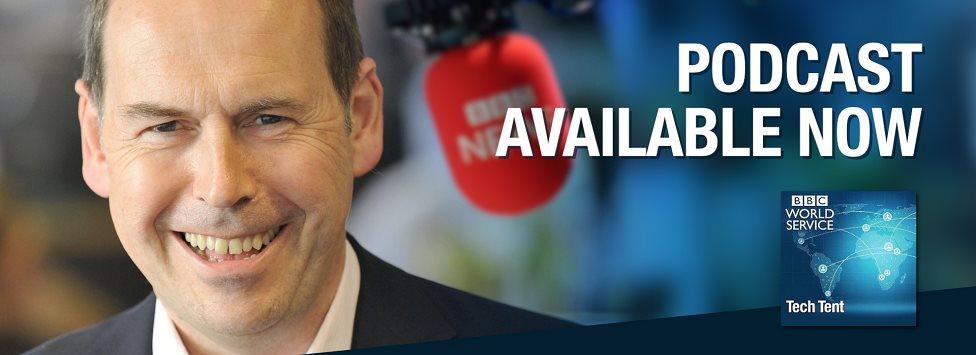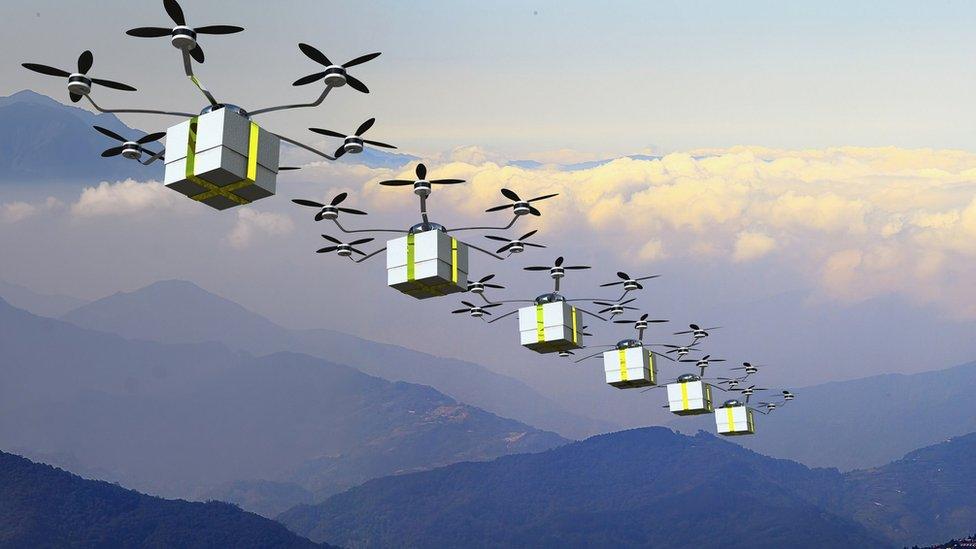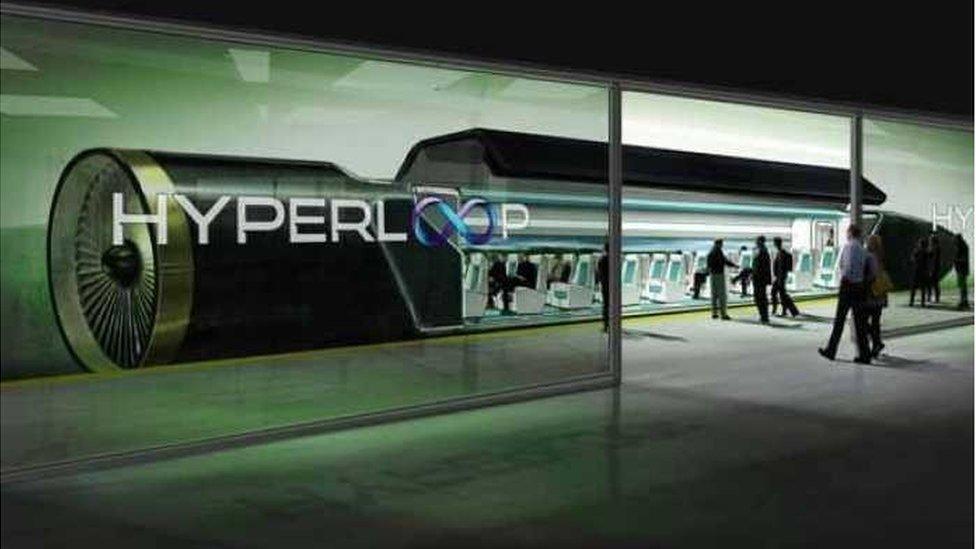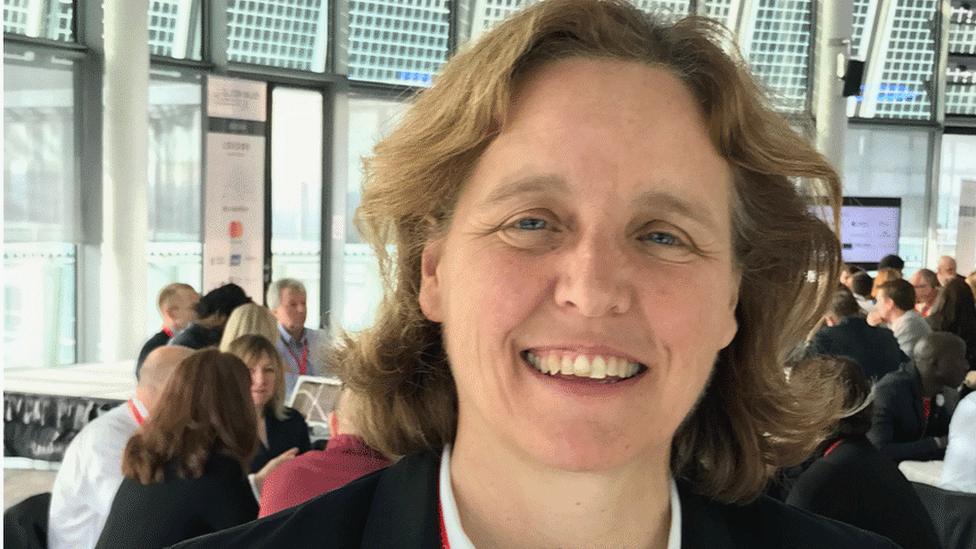Tech Tent - three 'far-fetched' visions of the future
- Published

Stream the latest Tech Tent episode on the BBC website
Download, external the latest episode as a podcast
Listen to previous episodes on the BBC website
Listen live every Friday at 15.00 GMT on the BBC World Service

This week, Tech Tent features three people with far-fetched views of our tech future.
One believes fleets of drones will soon be filling our skies, delivering parcels to our doors. Another thinks we will be travelling at 700mph in a tube in a transport revolution that will transform travel between cities.
And, perhaps most outlandishly, a third is a fervent believer that governments can convince the public that technology - and in particular artificial intelligence - is a force for good.
Grab our podcast to hear these "blue-skies" thinkers.
Amazon drone delivery

When Amazon put up a video three years ago showing a drone delivering a parcel,, external many people thought it was a joke - or at least one of those concepts dreamed up in a strategy department never to see the light of day.
But when I met Amazon's Paul Misener in Manchester at the Innovate 2016 event, he made clear that Prime Air, as it is known, is deadly serious. The company's global head of innovation told a packed conference room that drone delivery was in a long tradition of Amazon ideas - from opening up its platform to other retailers to starting a cloud service - that were first pooh-poohed, then accepted as the norm.
Before his speech, he told me that much of the work on making Prime Air a reality was being done in Cambridge, England, where various types of drone suited to different territories and environments were being tested.
"We intend to deploy it around the world, " he said, "but we won't fly until we demonstrate the safety of the system." Mr Misener admits there are regulatory and ethical questions to be sorted out - and those worries seem to be mounting around the world as we heard from Sweden last week.
But when I put it to him that a future where the skies are filled with delivery drones will worry many he tells me "the sky is a big place". In a few years, Amazon reckons that when you want some small item in a hurry - say batteries for a new toy - you will click the button for drone delivery even if it is quite a pricey option. Maybe we had all better start marking out a drone landing zone in the back garden.
Hyperloopy?

Hyperloop One - could it provide a quick way to get from Manchester to Leeds?
If Amazon's drone plans sound ambitious, the Hyperloop One project seems downright insane to some. The idea of a new transport system which involves sending pods carrying passengers and freight through a vacuum tube at speeds of over 700mph was floated by Elon Musk a few years ago.
Hyperloop One is trying to turn that vision into a reality, and Alan James, a British engineer who promoted a maglev train as an option for high-speed travel in the UK, is now touring the world selling vacuum-packed transport.
Before an open-mouthed audience in Manchester - again at Innovate 2016 - he put up slides showing a potential Hyperloop link between Helsinki and Stockholm or one from Manchester to Leeds. The fact that one route would involve taking a tube across the Baltic Sea and the other drilling a tunnel through the Pennines seemed of little consequence. The time savings - and the wider economic benefit - were attracting interest from politicians around the world, according to Mr James.
Surely not in the UK, where planning rows are making even good old-fashioned rail projects subject to infinite delays? Alan James insists he is getting a hearing and, as if to make his point, an official from the government-funded Innovate UK came up to shake his hand - and then confirmed to me that the Hyperloop idea was at least being put in front of ministers in briefing documents.
Mind you, it sounds as though Dubai, where Hyperloop will encounter far fewer planning constraints, is a better bet for the first commercial realisation of the idea. If - and it's a big if - the project proves that it is technically and financially viable.
Obama's Tech Vision

Megan Smith thinks it will be a "long road" getting citizens ready for the impact of AI
If any politician seems willing to engage with such blue-skies ideas on our technological future it is President Barack Obama. He has just been a guest editor of Wired Magazine, external, talking with enthusiasm about how artificial intelligence is already transforming our world and promises more radical changes.
This week, his chief technology officer - an innovation introduced under his administration - is visiting the UK and talking about what has been learned about the process of digital government. When I caught up with Megan Smith at the annual Silicon Valley Comes to the UK meeting, she was bubbling with ideas about how to prepare society for the impact of artificial intelligence.
But we are in a period when the world and, in particular, middle America has fallen out of love with Silicon Valley's tech utopianism. I put it to her that people in America's rust-belt, where manufacturing jobs are threatened by outsourcing to China or to robots, would not be impressed by the Obama administration's promises of code camps to improve their digital skills.
She refused to concede that but admitted it would be a long road to transform America - or indeed the UK - to ready people for the full impact of technology such as AI.
Of course her road, along with that of President Obama, is now running out. I now realise I missed a trick by failing to ask how she thought technology might fare under a President Trump.